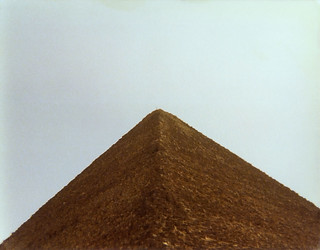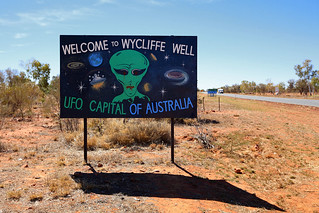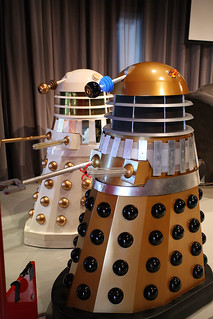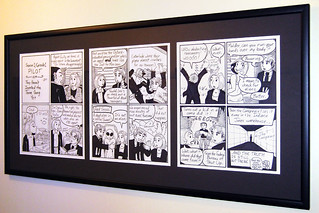

| Archive Blog Cast Forum RSS Books! Poll Results About Search Fan Art Podcast More Stuff Random |
|
Classic comic reruns every day
|
1 {photo of a man performing a magic trick near a London telephone box}
1 Caption: Magic and Reality
|
First (1) | Previous (3280) | Next (3282) || Latest Rerun (2862) |
Latest New (5380) First 5 | Previous 5 | Next 5 | Latest 5 Annotations theme: First | Previous | Next | Latest || First 5 | Previous 5 | Next 5 | Latest 5 This strip's permanent URL: http://www.irregularwebcomic.net/3281.html
Annotations off: turn on
Annotations on: turn off
|
 Pyramid of Menkaure, Giza. Did aliens help build it? |
That last topic is a strange one. I am actually fascinated with mysterious, paranormal, and occult phenomena, including but not restricted to: cryptids, alien encounters, ghosts, psychic powers, magic, Atlantis, "ancient astronauts", Tarot, and pretty much anything else in this very wide grab bag of weirdness. If you've been reading my stuff for a while, you'll probably know I tend to be a very rational and scientifically minded person, so this may come as a bit of a surprise. However, I'm not interested in all of this stuff because I think any of it's real or has any real paranormal power (Tarot cards are obviously real; the question is whether they can be used for divination or not). I'm interested in these things as pieces of myth and legend that human culture has come up with.
This is not to say that I dismiss them all entirely either. There's a small chance, I suppose, that some unknown creature like Bigfoot or the Loch Ness Monster exists and just hasn't been compellingly documented yet. In fact it'd be extremely cool if this was the case and one day we did manage to find a specimen. But given the shaky evidence and amount of people actively looking, it seems unlikely.
 Theseus slaying the Minotaur. Truth or myth? |
But despite these stories being made up, they can certainly still be interesting and exciting. They're a form of fiction, and enjoying fiction is a fundamental part of human nature, as countless folk tales, novels, movies, and TV shows attest. The really interesting part comes when fantastic stories take on a veneer of truth. What if these things were actually real?
There's a distinction here, between imagining weird things to be real, and believing they are real. Between "people turning into wolves is cool to imagine; what kind of fun can we have if we pretend that can really happen?" and "the thing killing our sheep is a werewolf!" And there are two different ways of studying werewolves. You can look at the legends and tales about werewolves as examples of stories that people invent, track down the origins of those stories, see how they fit into human culture, and see what insights they may offer into human nature or interactions with other myths. Or you can examine bite marks on dead sheep and the tracks left nearby, decide "no ordinary wolf did this", and go out into the forest on the night of a full moon with a gun loaded with silver bullets.
The trouble I've found with a lot of books on these sorts of subjects is that they don't seem to want to make that distinction. Some years ago I ordered a book about Tarot from Amazon, because I was interested in the mythology behind the cards. I wanted to read about the confluences of symbolism and myth that led to, for example, the card called The Tower being associated with disaster and death, while the card called Death merely represented change. I wanted to read about how people have attributed mystical powers to the Tarot and what sort of interactions this belief had with the cultures in which it appeared. The blurb on Amazon for the book sounded promising.
However, when I got the book, I discovered that it read more like: "Here's the Tarot. It's a tool for finding guidance in your life or answering questions. Here's how you do it."
 Port Arthur. Allegedly one of the most haunted places in Australia. I didn't see any ghosts. |
The book is kind of schizophrenic. It starts with a chapter on dowsing, being one of the oldest forms of magical belief. It explains what dowsing is and how people thought the could use it to find water and all sorts of other stuff. It explains some of the beliefs around dowsing and how they have changed over time, and which historical English cultures practised it. Then it breaks into an interview with a modern day dowser, who talks about what he does and how effective it is (he claims very). And finally the chapter ends with instructions for how to develop your own dowsing ability, how to select a switch of wood to form your dowsing rod, how to focus your mind, and how to practise and achieve success as a dowser.
All the chapters are like this. An interesting bit about the history of some type of magical belief, followed by an interview with someone who professes to be a current practitioner of this magic, and finally a section on how to train yourself to do it. The book would be pretty good if it only had the first sections of each chapter and dropped the interviews and the stuff about how you can find ley lines and experiment with alchemy for yourself.
 Wycliffe Well (so small and remote it doesn't even have a Wikipedia entry!). Allegedly the "UFO capital" of Australia. I didn't see any UFOs. |
Over the years I've bought a handful of books on various occult, paranormal, and mysterious things from Amazon, and every single one has been like this. I just want to find some good books on these topics written by someone who doesn't implicitly believe in the truth of them. The best I've found so far are actually collections of columns written for Steve Jackson Games' roleplaying magazine Pyramid, by Kenneth Hite. His column, titled Suppressed Transmission, delved into weird topics each issue, with a (very) slight slant to how they could be used in gaming scenarios. The columns have been collected into two volumes, which I highly recommend to anyone interested in this sort of stuff.
Anyway, I was chatting with a friend and I mentioned my frustration with The Book of English Magic that I was currently reading. I said it had all this cool historical stuff about magic, and he nodded and agreed it sounded interesting. Then I complained about the sections in which magic was discussed under the unquestioning assumption that it was real. He said, "Oh man... it's stuff like that that makes me just want to give up on a book." I then posted the question to him: Was it weird for someone so scientifically rational and sceptical[1] about the paranormal to be so interested in it as a cultural phenomenon? He said not at all, he felt the same way.
 A guy doing magic tricks and selling card trick kits. |
When I was a kid, there was a series on TV, hosted by Leonard Nimoy, called In Search Of.... This was cool for two reasons: firstly Nimoy was Spock, after all. And secondly, the series was all about cool stuff. Not all of it was weird or paranormal; they also had episodes about trying to locate famous missing persons like Amelia Earheart, or about the science of predicting earthquakes. But most of it was things like cryptids or Atlantis or ghosts or psychic abilities and stuff. The show took a liberally "balanced" approach, offering various opinions and leaving any conclusions open to the viewer.
The show was intriguing to a kid, and opened my eyes to the possibilities that the world might be stranger than I had ever imagined. This sort of thing has a powerful effect on a young mind. I don't recall ever believing in Santa Claus as a child. As far back as I can remember, I always knew Santa Claus was just a story, and Christmas presents were really bought by parents and other relatives. Same with the Easter Bunny and the Tooth Fairy - I was always fully aware that these were just fun fictions. But In Search Of... suggested other, wilder possibilities. Did plants really have feelings? Did alien visitors really help the Egyptians build the Pyramids? Could I possibly have ESP?
 A modern day form of mythology and weirdness. |
Sagan grew up to become a scientist, an eminently rational thinker, and a sceptic of the unexplained. He was my prime inspiration for finding out as much as I could about science and eventually becoming a scientist myself. At the time this began happening, I was still a kid, and there seemed little distinction between Leonard Nimoy's mysteries and the mysteries of the cosmos presented by Sagan. It was all mysterious and amazing and fascinating to a young person growing up. Besides wanting to grow up to be a scientist, I also wanted to grow up to be a magician. Not someone who does stage tricks, but someone who does real magic. What could be more exciting than that?!
In a way, I think all kids are a bit like this. It's part of why things like the Harry Potter series are so compelling. If Harry can be a wizard, why can't I? That's what I'll try and do when I get older!
At some point, most people start to make distinctions between what is real and what is fantasy. As I explored more books in the library and learnt more things at school, I realised that some of these amazing things were true, like radioactivity. It was actually true that some metals gave off weird rays of energy that could hurt you, and that these things could be used somehow to make electricity and run our TV sets. And that some of these things were kind of made-up stories, like Santa Claus and the Tooth Fairy. That ghosts probably didn't really exist. That I probably couldn't teach myself to read other people's minds. That magic was probably all just stage tricks and not real.
 Shaenon Garrity's Monster of the Week, a webcomic recap of The X-Files, one of my favourite TV shows. Strip 1 original artwork, hanging on my wall. :-) |
I see no shame in being interested in ghosts and UFO sightings and Atlantis and what have you. I love reading about this sort of stuff (or seeing documentaries about it). But I do prefer to read (or see) about it from a historical/mythological perspective. Not the perspective of "Hey, look at all this anecdotal evidence! Sure, nobody's ever found and studied an actual specimen, and pretty much every bit of evidence could easily have been fabricated, but Bigfoot totally exists!!"
I think there must actually be a lot of people in the same boat. The modern day geek enjoys science and technology and is usually quite rational, but also enjoys science fiction and fantasy and the blend of historical mythologies and modern weird stuff that they capture. The question is, why is it so hard to find a good book or documentary that examines weird phenomena in detail from a historical, mythological, rational, and ultimately sceptical point of view? Why can't I find a comprehensive book about Tarot written by someone who doesn't believe in the occult power of Tarot?
Maybe the Truth is Out There. But I haven't found it yet.
[1] I use the words "sceptic" and "sceptical" to refer to someone who does not accept things without some compelling evidence, and who is willing to change their mind when presented with evidence. All good scientists are sceptics - scepticism is one of the hallmarks of doing science properly. I am sceptical of the existence of Bigfoot, but if a specimen is discovered and confirmed by a review of primate biologists, then I would be convinced that such creatures do exist. I was (at one point) sceptical of quantum mechanics, but have since learnt enough about how it works and the experiments that can be performed to verify aspects of it (and in some cases performed such experiments myself), that I am now convinced that it is an extremely good and useful reflection of reality. This is in contrast to people like so-called "climate change sceptics" and "vaccination sceptics", who merely disbelieve any evidence that conflicts with their beliefs and who are not willing to change their minds at all. It is certainly possible to be truly sceptical about human-induced climate change or vaccination safety, but after reviewing the available evidence a sceptic will either be convinced that the scientific consensus is largely correct or at least be wide open to that possibility as very likely. Maintaining a state of absolute denial is the mark of denialism rather than scepticism.
|
LEGO® is a registered trademark of the LEGO Group of companies,
which does not sponsor, authorise, or endorse this site. This material is presented in accordance with the LEGO® Fair Play Guidelines. |